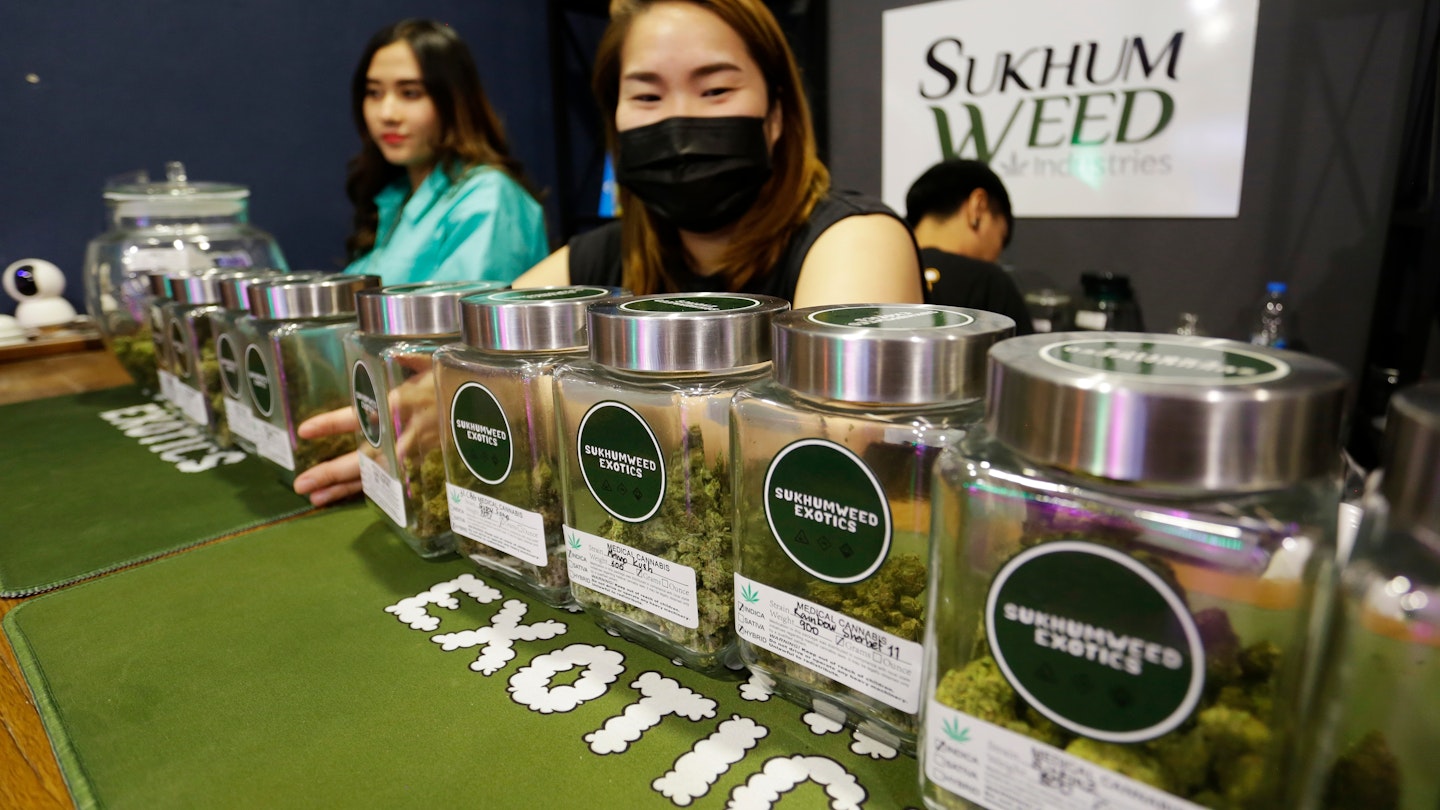Thailand, once known for its stringent drug policies, is now stepping into the cannabis market. This shift, however, comes with its complexities.
Medical cannabis was legalized in Thailand in 2018, making it the first country in Asia to allow marijuana for medicinal and industrial purposes. By 2022, the Thai Food and Drug Administration decriminalized marijuana and hemp by removing them from the Category 5 narcotics list. Consequently, with specific restrictions on individuals under 20 and pregnant or breastfeeding mothers, anyone else could grow, smoke, consume, sell, and buy cannabis without facing penalties.
Nevertheless, current laws state that extracted cannabis contents must contain less than 0.2% THC, which is regarded as a minimal amount for achieving psychoactive effects. This decriminalization has led to a surge in unlicensed vendors, with countless entrepreneurs openly selling cannabis products that significantly exceed the government’s THC limit.
As of now, Bangkok’s Khao San Road showcases streetside tables laden with cannabis products that surpass legal limits. In Chiang Mai, visitors can enjoy high-THC marijuana-infused cocktails, while some Thai islands see bongs being used in public. This situation has persisted without intervention, as officials struggle to enforce current THC regulations.

The Confusing Legality of THC in Thailand
Even with decriminalization, the Thai government remains uneasy about public marijuana use. To address this concern, authorities enforce the 1992 Public Health Act, which prohibits any public disturbance caused by smoke or odor. Violating this law can result in fines of up to 25,000 baht (approximately US$690) and three months in jail.
Authorities have advised visitors to keep recreational marijuana use discreet, suggesting that as long as it’s not done in public, there should be no issues. However, plans for a new bill set to pass in late 2024 aim to restrict cannabis use to only medical and health-related purposes while banning all recreational use. This legislation will also require permits for cultivation, importation, and commercial use of cannabis products.
Expect significant fines, reaching 60,000 baht ($1,700), for violations related to recreational use. However, vague definitions of what constitutes “recreational” use persist, with the current draft lacking clarity regarding prescriptions or what qualifies as medical exceptions.

What This Means for Tourists
Tourists are advised to stay updated on the evolving cannabis regulations, as sudden changes could leave even the most well-intentioned visitors subject to arrest or fines. Even after the proposed cannabis regulation bill becomes law, the industry, valued at $1.2 billion, is not likely to vanish overnight. The numerous shops may undergo rebranding, but amounts deemed medically necessary versus recreational continue to be undefined.
Thus, significant changes could occur in the coming months, either strengthening the bill or putting it on hold. The government has indicated its commitment to giving businesses time to adapt, which should logically extend to patrons as well.
If you are in Thailand and require low-level THC or CBD cannabis for medicinal purposes, you can find a prescription at approved hospitals and clinics, which are expected to remain operational after the new legal framework is established.
As the situation evolves, it’s wise to proceed with caution regarding any cannabis-related activities, much like with any controlled substance within Southeast Asia.

Marijuana in Food and Beverages
Current regulations stipulate that food and drink products containing cannabis must adhere to the less than 0.2% THC limit, but enforcement is lacking. The decriminalization of cannabis has spurred numerous food and beverage establishments to incorporate cannabis-infused items. Interestingly, a notable company has even introduced a cannabis-infused fish sauce while various drinks with marijuana-derived ingredients are available in convenience stores. However, recent studies indicate that about 30% of these products exceed the legal THC threshold.
Bringing Cannabis Products to Thailand
Travelers should not take cannabis products to Thailand. According to the Tourism Authority of Thailand, products with cannabis and hemp extracts, or any components exceeding 0.2% THC, are still classified as Category 5 Narcotics. Therefore, bringing cannabis-related items into Thailand poses a substantial legal risk.
Nevertheless, until the new bill is enacted, carrying marijuana in public, on public transport, and even on domestic flights remains legal, as confirmed by the Airports of Thailand Authority (AOT).
This article has been updated to reflect the latest changes and developments regarding Thailand’s marijuana policies.





